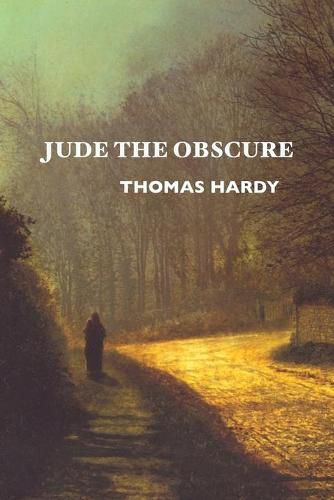Readings Newsletter
Become a Readings Member to make your shopping experience even easier.
Sign in or sign up for free!
You’re not far away from qualifying for FREE standard shipping within Australia
You’ve qualified for FREE standard shipping within Australia
The cart is loading…






This title is printed to order. This book may have been self-published. If so, we cannot guarantee the quality of the content. In the main most books will have gone through the editing process however some may not. We therefore suggest that you be aware of this before ordering this book. If in doubt check either the author or publisher’s details as we are unable to accept any returns unless they are faulty. Please contact us if you have any questions.
THOMAS HARDY: JUDE THE OBSCURE
Edited by Margaret Elvy
A new edition of Thomas Hardy’s last novel Jude the Obscure 1895), a sister (or brother) book to Tess of the d'Urbervilles (1891), before the author turned to poetry and other forms of writing. Thomas Hardy attacks similar targets as he did in Tess: the family, politics, religion, marriage, education and sexuality. Hardy was on fire when he wrote Jude the Obscure - it is a very angry work.
Jude the Obscure contains far more polemic and philosophizing than Tess or any of Thomas Hardy’s earlier novels. The preaching and polemic threatens to undo the narrative, which is nevertheless ‘realist’, like other Thomas Hardy fictions.
In Jude the Obscure, Thomas Hardy was stretching the novel to the limit, testing the boundaries of what is ‘acceptable’. In Jude the Obscure, the things that say ‘you shan’t’ are, variously, God, religion, education, circumstance, chance, nature, and marriage. All of the institutions and ‘causes’ reside inside the individual, which is what makes the problems they create so difficult to deal with for Sue and Jude. Patriarchy, culture and society are not in some ‘out there’ space, but in people. Hardy’s thoughts on Jude the Obscure, as expressed in the Life and letters, include his desire for a novel about characters ‘into whose souls the iron has entered’; a desire to make the story ‘grimy’ in order to heighten the contrast between the ideal life and the ‘squalid real life’; the novel ‘makes for morality’, Hardy said; and ended up ‘a mass of imperfections’, a remark many artists have made of their work.
Includes illustrations, an introduction, bibliography and notes. Paperback.
$9.00 standard shipping within Australia
FREE standard shipping within Australia for orders over $100.00
Express & International shipping calculated at checkout
Stock availability can be subject to change without notice. We recommend calling the shop or contacting our online team to check availability of low stock items. Please see our Shopping Online page for more details.
This title is printed to order. This book may have been self-published. If so, we cannot guarantee the quality of the content. In the main most books will have gone through the editing process however some may not. We therefore suggest that you be aware of this before ordering this book. If in doubt check either the author or publisher’s details as we are unable to accept any returns unless they are faulty. Please contact us if you have any questions.
THOMAS HARDY: JUDE THE OBSCURE
Edited by Margaret Elvy
A new edition of Thomas Hardy’s last novel Jude the Obscure 1895), a sister (or brother) book to Tess of the d'Urbervilles (1891), before the author turned to poetry and other forms of writing. Thomas Hardy attacks similar targets as he did in Tess: the family, politics, religion, marriage, education and sexuality. Hardy was on fire when he wrote Jude the Obscure - it is a very angry work.
Jude the Obscure contains far more polemic and philosophizing than Tess or any of Thomas Hardy’s earlier novels. The preaching and polemic threatens to undo the narrative, which is nevertheless ‘realist’, like other Thomas Hardy fictions.
In Jude the Obscure, Thomas Hardy was stretching the novel to the limit, testing the boundaries of what is ‘acceptable’. In Jude the Obscure, the things that say ‘you shan’t’ are, variously, God, religion, education, circumstance, chance, nature, and marriage. All of the institutions and ‘causes’ reside inside the individual, which is what makes the problems they create so difficult to deal with for Sue and Jude. Patriarchy, culture and society are not in some ‘out there’ space, but in people. Hardy’s thoughts on Jude the Obscure, as expressed in the Life and letters, include his desire for a novel about characters ‘into whose souls the iron has entered’; a desire to make the story ‘grimy’ in order to heighten the contrast between the ideal life and the ‘squalid real life’; the novel ‘makes for morality’, Hardy said; and ended up ‘a mass of imperfections’, a remark many artists have made of their work.
Includes illustrations, an introduction, bibliography and notes. Paperback.